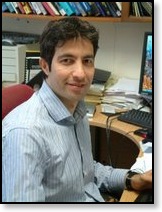Abstract : A fluid/elastic network architecture which supports “user centric” services will be a central feature for 5G wireless networks. Such a fluid architecture leverages the fact that for ultra-dense networks, the control and the user-planes can be decoupled. Consequently, the network can be treated as a soft entity which can support a variety of user demands by dynamic reconfiguration of the user plane. Furthermore, activities across heterogeneous control planes can be coordinated through the network state awareness and resource virtualization. It is difficult if not impossible to realize such an architecture without the real time network and the user state data. With around 6.2 billion internet-connected devices by the end of 2020, the generated data has enormous volume, high velocity and huge variety. In this talk, the main objective is to highlight how networks can be configured by leveraging big data empowered self-organization. The design framework for the big data empowered self-organized networks under split-plane architecture presents various opportunities and challenges. Such an architecture is an ideal candidate to unify evolving technologies into a unified framework. The key architectural ingredients which will be explored briefly in this talk are:
a) Proactive vs. Reactive Networks ;
b) Big Social Data ;
c) Information Centric Network Design ;
d) Self Organization for 5G Networks ;
e) Cloud RAN and HetNets ;
f] Energy Efficiency and Harvesting.
Professor Mounir Ghogho received the MSc degree in 1993 and the PhD degree in 1997 from the National Polytechnic Institute of Toulouse, France. He was an EPSRC Research Fellow with the University of Strathclyde, Glasgow (Scotland), from September 1997 to November 2001. Since December 2001, he has been a faculty member with the school of Electronic and Electrical Engineering (top 5 EEE schools in the UK for Research) at the University of Leeds (UK), where he currently holds a Chair in Signal Processing and Communications. He is also currently the ICT Research Director at the International University of Rabat. He is currently an Associate Editor of the IEEE Signal Processing magazine. He served as an Associate Editor of the IEEE Transactions on Signal Processing from 2005 to 2008, the IEEE Signal Processing Letters from 2001 to 2004, and the Elsevier Digital Signal Processing journal from 2011 to 2012. He is currently a member of the IEEE Signal Processing Society SAM Technical Committee. He served as a member of the IEEE Signal Processing Society SPCOM Technical Committee from 2005 to 2010 and a member of IEEE Signal Processing Society SPTM Technical Committee from 2006 to 2011. He was the General Chair of the eleventh IEEE workshop on Signal Processing for Advanced Wireless Communications (SPAWC’2010), General Chair of the 21st edition of the European Signal Processing Conference (EUSIPCO 2013), the Technical co- Chair of the MIMO symposium of IWCMC 2007 and IWCMC 2008, and a Technical Area co-Chair of EUSIPCO 2008, EUSIPCO 2009 and ISCCSP’05. His research interests are in wireless communication and information/signal processing. His research work has partly but continuously been funded by the US Army since 1998. He held invited scientist/professor positions at many institutions including the US Army Research Lab (USA), Télécom Paris-Tech (France), National Institute of Informatics (Japan), the University Carlos Third of Madrid (Spain), ENSICA (France), Technical University of Darmstadt (Germany), the University of Minnesota (USA), and Beijing University of Posts and Telecommunication (China). He is the EURASIP Liaison in Morocco. He was awarded the five-year UK Royal Academy of Engineering Research Fellowship in September 2000. He is also one of the recipients of the internationally competitive 2013 IBM Faculty award.

